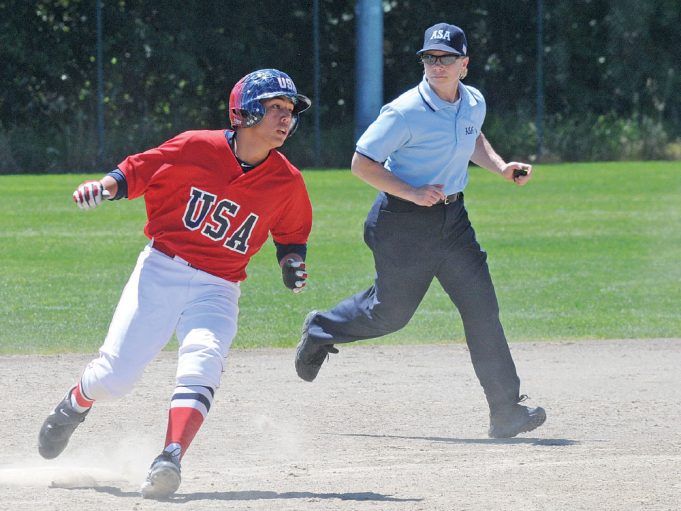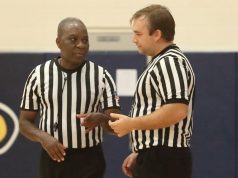W
hat attributes separate good officials from average officials? That question has been posed often over the years. While there doesn’t seem to be a definitive answer, here are some of the qualities each of them shares.
Good officials know the rules. Great ones understand the intent of the rules and concentrate on applying them with that in mind. They don’t run around like walking rulebooks, looking for hypertechnical infractions to call. Instead, they have a great feel for the game and call what matters. They don’t call holding on the left tackle if a sweep goes around the right end or get worked up because the tip of a batter’s toe in a baseball game is outside the batter’s box. The don’t prevent a batter in baseball from advancing to first on a hit by pitch because he or she froze on a breaking ball.
They know it is worse to call a foul that is not there (a “phantom” call) than to miss one that is. When they make a call, they make it big, and before blowing the whistle or making the call, they work through a mental process: “I think it’s a foul, I’m sure it’s a foul, I know it’s a foul.”
Good officials hustle. Great officials know they can hustle themselves right out of the play. A back judge doesn’t need to race in and jam his nose in the ball carrier’s face when he is downed 25 yards downfield. Umpires don’t have to be so close to a play they could become entangled with a runner or fielder. Basketball officials have to keep distance in order to judge if the defender is in legal guarding position or the dribbler charged into the opponent. In those cases, officials get tunnel vision and don’t see what happens right around them, or they take their eyes off the play too quickly.
Great officials understand the concept of cruise control. They know if they move smoothly and rhythmically, but deliberately, and keep the same tempo throughout the game, they’ll see and digest more of what happens. Moreover, they send the message it isn’t their first rodeo and they know what they’re doing — demonstrating confidence, not cockiness.
Good officials know the basic mechanics of their position, including which players they are responsible for watching. Though it may not be their responsibility, they monitor the clock (in those sports where one is used) to be sure it stops and starts when it should. They pay attention when penalties are enforced or bases are awarded even if they are not involved, so they can bail out the crew if someone has a vaporlock.
Great officials know that personality, being positive and having a sense of humor can go a long way with coaches, players and crewmates. You have to be careful with humor; too much, the wrong comment at the wrong time or the wrong delivery can turn a bad situation into a disaster. But there is no reason you can’t be pleasant until circumstances force you to put on a more serious face. Squabbling with your crew in the pregame or during the game will have a negative effect on your in-game performance.
Great officials keep themselves in top physical shape. That’s not only because it helps them keep up with the players, be where they need to be and stay focused for however long the game lasts, but also because they realize the importance of presentation. It has often been said perception is as or more important than reality. If an official is in good physical shape and is well groomed, fans, coaches and players will be more inclined to give the benefit of the doubt.
Overweight, sloppy officials may be able to do the job well in terms of rules, mechanics and judgment, but their appearance makes people think they are less competent than they are. Not fair, maybe, but a fact of life.
Great officials have terrific communication skills. An underappreciated quality is the ability to not only listen to coaches, but making them think you are doing so. Ultimately, they want to be heard, and one of the best things we can do is keep our mouths shut and let coaches get whatever it is off their chest. When we come back with, “Now what I hear you saying is …” or, “I understand where you’re coming from …” and then explain how we ruled, we are more likely to get our point across and be perceived positively than if we are agitated, the first to talk and must have the last word.
Sometimes, of course, coaches can get out of control, and then we have to just walk away. But in general it is best to keep calm, be approachable, listen and establish a dialogue. Along that line, talk to players when their actions border on fouls, because preventive officiating is a good thing.
Great officials understand the importance of a thorough pregame. That’s important in terms of crew coordination and preparing everyone to do their jobs well. Don’t talk about once-in-a-lifetime situations, but discuss the teams, their styles of play, new rules or interpretations and other aspects that are more likely to challenge you.
Great officials are great dead-ball officials. The late NFL referee Red Cashion developed the concept of rings, meaning that instead of having all eyes focused on the dead-ball spot, the official covering the end of the play watches the action around that spot, the next-closest officials watch the larger ring and the officials farthest away from the play watch the rest of the field. That way, cheap shots that occur 20 yards from the play and cause hostility to brew quickly won’t be missed.
The concept isn’t exactly the same in other sports, but you get the idea. Players — even those who aren’t around the ball — commit fouls. Keep an eye on them even when the play is seemingly over.
Great officials have guts. If they know something needs to be called, they call it. They don’t worry about how it will look when the game film gets graded. If they are newer officials, they don’t abdicate their responsibilities because they are surrounded by veterans or are awed by their new surroundings. They do their job, come hell or high water.
What's Your Call? Leave a Comment:
Note: This article is archival in nature. Rules, interpretations, mechanics, philosophies and other information may or may not be correct for the current year.
This article is the copyright of ©Referee Enterprises, Inc., and may not be republished in whole or in part online, in print or in any capacity without expressed written permission from Referee. The article is made available for educational use by individuals.
















